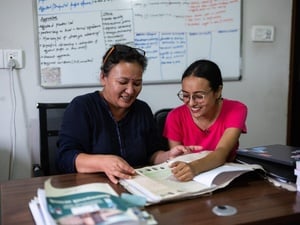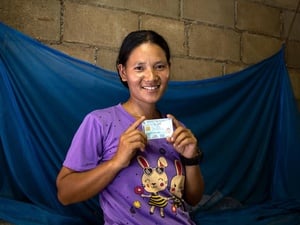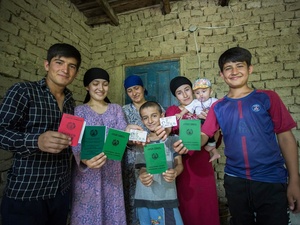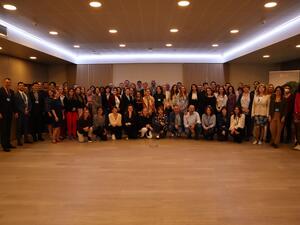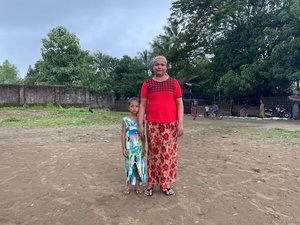Statelessness: UNHCR hails new support, urges more action on treaties
Statelessness: UNHCR hails new support, urges more action on treaties

UNHCR chief António Guterres congratulates Croatian President Ivo Josipović on the accession as Patricia O'Brien, UN Under-Secretary-General for Legal Affairs, looks on.
GENEVA, September 23 (UNHCR) - Three additional countries have formally adopted international legal standards to keep stateless people from falling into legal limbo - a sign that the campaign against statelessness is gaining momentum but still needs considerable international support.
This week, Croatia, Nigeria and the Philippines deposited their instruments of accession/ratification at an annual treaty event on the sidelines of the UN General Assembly in New York. The treaties concerned are the 1954 Convention relating to the Status of Stateless Persons, which defines who is considered stateless and establishes minimum standards of treatment, as well as the 1961 Convention on the Reduction of Statelessness, which provides principles and a legal framework to prevent statelessness.
Up to 12 million people are believed to be stateless worldwide. They have no nationality, usually lack valid identity documents, and are often denied even the most basic rights, including access to health care, education, housing and jobs.
Today, the bulk of new stateless cases involve children born to stateless parents. This can be prevented if more countries accede to the 1961 Convention and offer citizenship to stateless children at birth.
On Thursday, High Commissioner António Guterres welcomed Croatia as the 40th state to become party to the 1961 Convention. Guterres congratulated Croatian President Ivo Josipović after he submitted documents to the UN and confirmed his government's commitment to prevent future cases of statelessness. Croatia has an estimated 1,700 citizens of the former Yugoslavia who are either stateless or at risk of becoming stateless. UNHCR is working to provide them with legal aid to resolve the issue.
Depositing Nigeria's instruments on Tuesday, President Goodluck Jonathan was quoted in Nigerian media as saying that accession was a demonstration of the "country's resolve to ensure that everyone has an effective right to nationality." Given Nigeria's diplomatic weight, UNHCR expects the country's accession to boost efforts to promote accession and address statelessness in Africa.
With this week's developments, the Philippines has become the first country in Southeast Asia to become party to the 1954 Convention. "We are pleased to welcome the Philippines as the first country in the region that has committed to protecting the rights of stateless people," said Bernard Kerblat, UNHCR's representative in the Philippines. "We now have a country in Southeast Asia which tells the world: 'We care for the stateless'."
The Philippines has a long tradition of giving sanctuary to stateless people and there are legal mechanisms to regularise their status. Later this year, UNHCR and the authorities will join forces in an exercise to determine how many stateless people there are, and where they live in the country. The refugee agency is also supporting the government to amend its nationality legislation to prepare for accession to the 1961 Convention.
The Philippines actually was one of the first 23 countries to sign the 1954 Convention before it closed for signature on 31 Dec 1955, and has now ratified it to put it into effect. Other signatory states that have yet to ratify the 1954 Convention include Colombia, El Salvador and Honduras. Signatory states that have not acceded to the 1961 Convention are the Dominican Republic, France and Israel. UNHCR is working with a number of these States to ensure that their signature of these conventions decades ago is followed by ratification.
In total, the numbers of states that are party to the 1954 and 1961 Conventions now stand at 68 and 40 respectively. These figures are disappointingly low given that the UN has 193 member states. International support is growing but it still lacks the critical mass to make a substantial difference in the global campaign against statelessness.
UNHCR is calling on governments to seriously consider acceding to both treaties. The agency is also urging those states that are considering accession to start procedures at the national level.
More countries are expected to follow the example set by Croatia, Nigeria, the Philippines and Panama - which acceded in June - and become party to one or both of the statelessness conventions. To mark the 50th anniversary of the 1961 Convention, UNHCR will hold a treaty ceremony during the ministerial-level meeting in Geneva in early December. There are already indications from a number of states that they will accede or pledge to do so at this event.
With reporting by Yanya Viskovich in New York and Tom Temprosa in Manila



